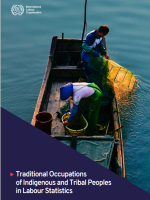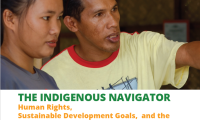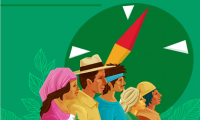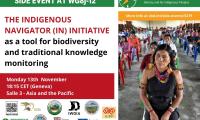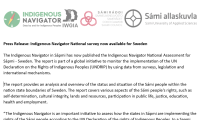Available now - Technical paper: Traditional Occupations of Indigenous and Tribal Peoples in Labour Statistics
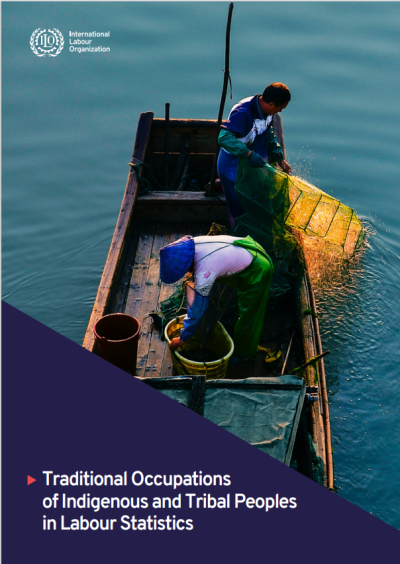
The objective of this technical paper is to facilitate reflection on possibilities for capturing the practice of the traditional occupations of indigenous and tribal peoples in labour statistics as a means to understand and monitor related trends and build evidence for public policymaking.
The International Labour Organization (ILO), together with the Indigenous Navigator consortium and with support from the European Union, has published this technical paper on how to measure the traditional occupations of Indigenous and tribal peoples in labour statistics. The paper aims to facilitate reflection and discussion on the concepts, definitions, indicators, and data sources for capturing the practice of these occupations, which are important for their cultures, livelihoods, identities, and environmental protection.
This paper aims to take this work forward by providing an overview of how traditional occupations are or could possibly be covered better in labour statistics, including options for a statistical definition and statistical indicators. An earlier draft of the paper was discussed in a consultation with indigenous experts in late 2021. The current version has benefited greatly from the insights and observations of these experts. It has been prepared to facilitate further consultations among indigenous peoples’ representatives and experts and among statistical experts from relevant national institutions and UN system entities. It seeks to provide a basis for further discussion and development of definitive and comprehensive guidance and supporting materials on the collection and compilation of statistics on traditional occupations and the preparation of future reports presenting data on indigenous peoples for use in particular by:
- Staff in national statistical offices and other research agencies who wish to compile statistics on indigenous populations and their occupations;
- Researchers preparing reports and studies on traditional occupations; and
- Representatives of indigenous and tribal peoples who want to understand the information available and help shape the development of information on traditional occupations.
The paper provides an overview of the challenges and opportunities for identifying indigenous and tribal peoples and their traditional occupations in official statistics, and proposes some options for a statistical definition and indicators based on existing classification systems. The paper further acknowledges the limitations of measuring the practice of traditional occupations based on classification systems alone, and suggests that additional information on the use of indigenous knowledge at work would be desirable. It also identifies potential future work and next steps to develop comprehensive guidance and indicators on the collection and compilation of statistics on traditional occupations.
The paper is available for download from the ILO website here. It is expected to stimulate further consultations among indigenous peoples’ representatives and experts, as well as among statistical experts from relevant national institutions and UN system entities.
This discussion paper was prepared for the International Labour Office by David Hunter, StatClass Consulting Services, with contributions from Joji Cariño, Senior Policy Advisor at the Forest Peoples programme, Martin Oelz and Gabriela Balvedi from the ILO Gender, Equality, Diversity and Inclusion Branch, as well as Sandra Mora Caballero, who undertook the data analysis for the experimental estimates presented in Chapter 8.
The paper benefited from feedback provided by Kieran Walsh and Lara Badre from the ILO Department of Statistics. Mansour Omeira contributed to its finalization. An earlier version was the subject of consultations with Indigenous experts in late 2021.
Views expressed do not necessarily represent the position of the International Labour Organization or the European Union.
Copyright © International Labour Organization 2023
First published 2023
- This is an open access work distributed under the Creative Commons Attribution 4.0 International License (https://creativecommons.org/licenses/by/4.0/). Users can reuse, share, adapt and build upon the original work, as detailed in the License. The ILO must be clearly credited as the owner of the original work. The use of the emblem of the ILO is not permitted in connection with users’ work.
- Attribution – The work must be cited as follows: Traditional Occupations of Indigenous and Tribal Peoples in Labour Statistics, Geneva: International Labour Office, 2023
- Translations – In case of a translation of this work, the following disclaimer must be added along with the attribution: This translation was not created by the International Labour Organization (ILO) and should not be considered an official ILO translation. The ILO is not responsible for the content or accuracy of this translation.
- Adaptations – In case of an adaptation of this work, the following disclaimer must be added along with the attribution: This is an adaptation of an original work by the International Labour Organization (ILO). Responsibility for the views and opinions expressed in the adaptation rests solely with the author or authors of the adaptation and are not endorsed by the ILO.
- This CC license does not apply to non-ILO copyright materials included in this publication. If the material is attributed to a third party, the user of such material is solely responsible for clearing the rights with the right holder.
- Any dispute arising under this license that cannot be settled amicably shall be referred to arbitration in accordance with the Arbitration Rules of the United Nations Commission on International Trade Law (UNCITRAL). The parties shall be bound by any arbitration award rendered as a result of such arbitration as the final adjudication of such a dispute.
- All queries on rights and licensing should be addressed to the ILO Publishing Unit (Rights and Licensing), 1211 Geneva 22, Switzerland, or by email to rights@ilo.org.
- ISBN 978-92-2038939-3 (print) ISBN 978-92-2038940-9 (web pdf)
- The designations employed in ILO publications, which are in conformity with United Nations practice, and the presentation of material therein do not imply the expression of any opinion whatsoever on the part of the ILO concerning the legal status of any country, area or territory or of its authorities, or concerning the delimitation of its frontiers.
- The responsibility for opinions expressed in signed articles, studies and other contributions rests solely with their authors, and publication does not constitute an endorsement by the ILO of the opinions expressed in them.
- Reference to names of firms and commercial products and processes does not imply their endorsement by the ILO, and any failure to mention a particular firm, commercial product or process is not a sign of disapproval. Information on ILO publications and digital products can be found at: www.ilo.org/publns.

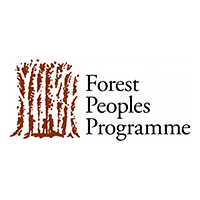

Le Groupe de travail international pour les affaires autochtones (IWGIA)
Contact

